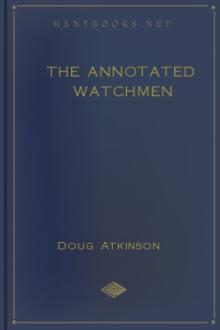Magic Hour by Susan Isaacs (i want to read a book TXT) 📗

- Author: Susan Isaacs
Book online «Magic Hour by Susan Isaacs (i want to read a book TXT) 📗». Author Susan Isaacs
“All right,” I said. “So what it boils down to is that Sy was just your average, malicious guy.”
“Except his malice got more intense as he got older—or as he got more successful and powerful. Look, maybe the man I married was no cute little cuddle bunny, but the Sy I got to know again after I gave him the Sea Change script was much harder, he was so full of himself, so disdainful of other people. Anyone who crossed him was bad, selfish, stupid and ipso facto deserved whatever damage Sy decided to inflict. In his mind, when he got back at someone, he was only making sure justice was done.”
“All right, think about this: Did he have any morals at all?”
Bonnie gave the question some serious, leg-swinging consideration. “He took decent political positions: apartheid is bad, rain forests are good. But no, I never saw any evidence of morals, not in a personal sense.”
MAGIC HOUR / 383
“So we could call him amoral.” She nodded. “And we can say, maybe, that he’d have no reservations about murder, it just was unnecessary or dangerous.”
“Or unseemly. Dartmouth men don’t kill.”
“But what if Sy had gotten past unseemly? Look, he was on a nine-year roll, making good movies, big money. He could do no wrong. Is it possible he got so conceited that he finally thought everything he did was by definition seemly?”
Bonnie wriggled farther back on the dresser and sat cross-legged. She grew reflective, staring past me into space. “Sure.
It’s possible. He believed his own publicity; Sy Spencer was superior, creative, refined. He could never be crass like the West Coast producers he was always going on about, screeching into their car phones or building bowling alleys in their houses. And he was so exquisitely sensitive he couldn’t possibly be cruel. But forget Sy’s idealized vision of Sy. I think all we’ve been talking about, all of what was going on in his life—thwarted love, his need for revenge, his need for money—played a part in pushing him toward the edge. What finally made him jump was that he got scared.”
“Of what?”
“Failure. The studios hadn’t gone for Starry Night, but he believed in it and so he went out and got the financing himself. Give Sy credit. He told me Starry would be the best kind of American movie, where characters grow and finally come to deserve each other. But Lindsay was ruining everything. Not only making a fool out of him with Santana, really wounding him, but destroying what he really cared about most: his movie, which was his reputation, his immor-tality.”
“So she was costing him an extra half mil, plus future profits. And cutting off his balls and breaking his heart with Santana.”
384 / SUSAN ISAACS
“More than that. She was making him lose status in the business. Sy told me this much: People were starting to say, See? We were right. Starry Night was a dog from day one.
And the way Lindsay’s performance was going—so lifeless—the critics and all his fancy friends would get into the elevator after a screening and say, Was that thing we just saw a Sy Spencer film?”
“But you know about those old guys out in Hollywood—those Goldwyn guys,” I countered. “They made movies the critics said were lousy, and all their so-called friends laughed at them, and they just went on.”
“But they were tough. They could take it.”
“You’re telling me Sy couldn’t?”
“Stephen, remember how we were talking about Sy being different things to different people, that he didn’t seem to have any core? Well, it wasn’t just something he chose to do when it amused him. Sy always let himself be defined by whoever he was with, and if those people were laughing at him—for being cuckolded by a fancy-pants like Victor Santana, or for making an adventure-romance that wasn’t adventurous or romantic—he would allow himself to be transformed into precisely what they were laughing at: a failure, a nothing, a jackass.”
“So he wanted her dead for making him a laughingstock.
But he wouldn’t have killed her himself?”
“No. I can’t see him injecting strychnine into her melon balls. Sy was much too squeamish to commit a violent act.
And he wouldn’t have dirtied his hands in the metaphorical sense. He was a gentleman; he never did anything nasty himself.”
“Somebody was there to do it for him.”
“Always.”
“So who did he know who would do that kind of MAGIC HOUR / 385
dirty work?” I asked. She knew, but she didn’t want to say it. “How about Mikey LoTriglio?”
“No.”
“Why not?”
“Because if Mikey or one of his boys did it, Lindsay Keefe would be on the cover of People this week, with a
‘1957–1989’ over her bazooms, and Sy would be rolling with Starry Night starring Nicholas Monteleone and Katherine Pourelle.”
I told her she was wrong, that La Cosa Nostra boys’ invincible reputation was a myth, and in fact, half the time they were such a bunch of screwups they made the FBI look good.
She said she’d read Wiseguy and knew all about sociopath-ic Mafia morons who couldn’t make it in the legitimate world, but Mikey was as clever as they come, and with a different background, he could have been CEO of Merrill Lynch.
I told her she was a fucking dunce, and she smiled at me and said she wasn’t.
I had to go into the kitchen to call Thighs at Headquarters, but I didn’t feel like leaving Bonnie because I liked looking at her, especially in my undershirt, which was a washed-out cotton you could sort of see through. Also, if I left her alone she’d probably wind up lying on the floor, bench-pressing my stereo, so I picked up the phone





Comments (0)